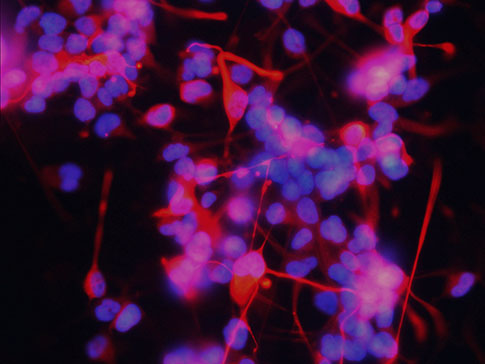Cancer Research UK-funded scientists may have discovered a new way to treat a type of childhood brain tumour that has proved incurable up until now, according to a study published in Nature Genetics today.
When Cancer Research UK funded scientists at The Institute of Cancer Research, London, studied biopsy samples from a type of childhood glioma called diffuse intrinsic pontine glioma, or DIPG,** they found that a quarter of them had an extremely rare genetic flaw which could be a potential new drug target. These findings were backed up by additional studies – also published in today’s Nature Genetics – carried out in collaboration with scientists in North America.
This flaw has not been found in any other type of cancer, but is also found in patients with a childhood development disorder known as Stone Man Syndrome, also known as fibrodysplasia ossificans progressiva, or FOP, where muscles can turn into bone.
If the genetic flaw is present in all cells of the body then a child will develop FOP, however if it only occurs in the brain then it could lead to DIPG, which is universally fatal.
Crucially, drugs are already being developed to treat this developmental syndrome, and it’s hoped that the same drugs might also help children with this rare form of brain tumour.
Study leader Dr Chris Jones, Head of the Glioma Team at the ICR, said: “Our study has uncovered a remarkable genetic link between two very different but distressing diseases – a rare inherited condition that turns muscles into bone, and a deadly form of childhood brain cancer.
“We believe that the genetic defect linking these diseases is a potential target for cancer therapies, not least because drugs already exist against similar targets in other cancers. Understanding the link between fibrodysplasia ossificans progressiva and diffuse intrinsic pontine glioma could offer new hope to patients and their families affected by both conditions.”
This particular form of glioma is a childhood brain cancer that affects between 20-30 children a year in the UK. The average survival is less than a year and there is currently no effective treatment.
The study is part of the Cancer Research UK Genomics Initiative, which is funded by Cancer Research UK through the Catalyst Club – a pioneering venture to raise £10 million for various research projects aimed at realising the benefits of personalised medicine for people with cancer.
Nell Barrie, Cancer Research UK’s senior science communication manager, said: “Although almost eight in 10 children with cancer now survive their disease, there is still a long way to go for certain childhood cancers. Further research is essential to discovering better and kinder treatments, particularly for brain tumours. Studies like this lay the groundwork for future treatments to ensure that there are more childhood cancer survivors in the years to come.”
For media enquiries contact Alan Worsley in the Cancer Research UK press office on 020 3469 8252 or, out of hours, on 07050 264 059.
Notes
- Taylor, K. Et al. Recurrent activating ACVR1/ALK2 mutations in diffuse intrinsic pontine glioma. Nature Genetics (2014).
- Also Wu et al and Buczkowicz et al (same journal)
** A total of 26 biopsy samples taken from children with diffuse intrinsic pontine glioma (DIPG) were studied, of which seven (27%) carried the mutation in the potential drug target ACVR1/ALK2. Identification of this mutation was possible thanks to biopsy samples from untreated glioma patients from the Necker Childrens Hospital in Paris, France. Across the three studies in which Dr Jones’ team contributed, 40/170 (24%) cases carried the mutation.
